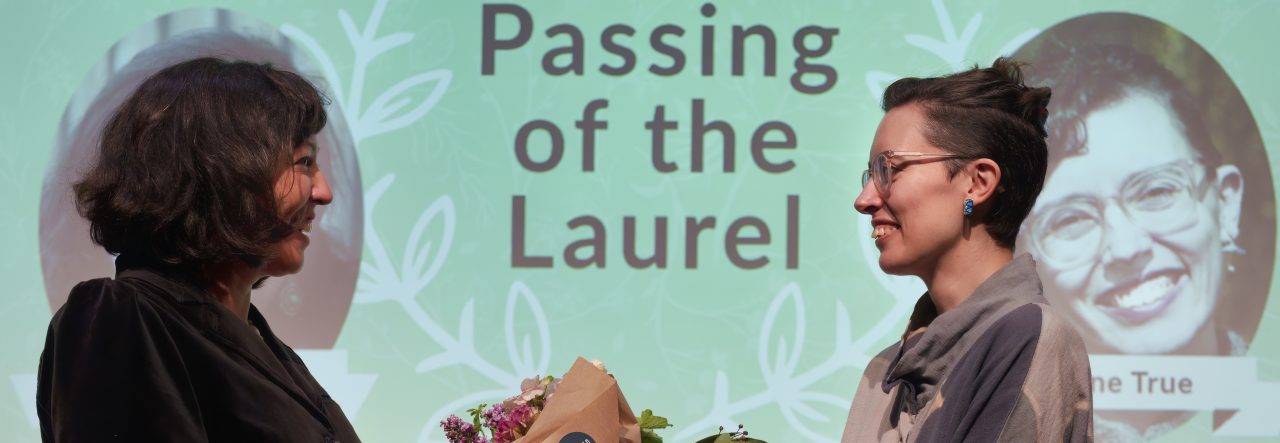As we approach the deadline for the WA 129 project, I thought that it might be useful to share a few directives that have always helped me when working on my own writing—both in generating new poems and thinking through older drafts.
- It’s always a challenge to find those poems that matter most to you, that come from intense feeling—but more than just feeling, intense intellectual engagement, extreme physical engagement (hiking, fence hole digging, yoga, and dance): those activities and passions in which the sense of self falls away and leaves verb, action, or, as William Carlos Williams put it—contact. And yet–it’s exactly those poems that we must search for, must apply ourselves to writing. Those urgencies are where the (fill in the blank: heart? spirit? soul?) reside, and it’s only those intensities that can initiate powerful poems. But see (B):
- Learn to subvert the “tyranny of our intentions.” That’s a phrase that Chris Howell used when I interviewed him for one of the conversations that ended up in Range of the Possible. Anyhow, I think that Howell’s caution is against trying to control our art too much and points us toward many valuable notions: Dean Young’s phrase “the art of recklessness” is another version of the same idea; we need to be receptive to the creative forces that are not immediately apparent to us; we need to realize our habits, the imaginative ruts into which we easily slip–and avoid such patterns. We need to understand that the subconscious is tuned in to creative energies that the rational may never recognize. Simply (ha!), be open to the swerves that your poem might take—the images that might not be exactly in the direction where you think the poem should go but that bring about something unexpected. The unexpected can lead to surprise (which can lead to astonishment, often the dwelling place of great art).
- Don’t judge yourself or your poems. One of my favorite anecdotes about writing comes from a Bill Moyers’s interview with William Stafford; Stafford talks about his writing routine; he wakes in the early morning (4 or 5 a.m.) and leans back on his couch with a legal pad to write down whatever comes to him; Moyers asks, “What if what you write isn’t any good?” Stafford, always cagey and wise, replies, “Then I lower my standards.” I don’t believe in writer’s block; I believe in our powerful ability to self-censor, self-scrutinize, shut down creativity before it even happens. So: lower your standards. Make something. Create. Go into the trance, “the realizations in language” that Stafford talks about in this video.
- Ilya Kaminsky gave a talk at this fall’s Litfuse Festival in Tieton. He was great, and he emphasized three simple generalizations about writing that are always smart to keep in mind. First, think about how your nouns should usually be images; think of the difference between “a plate heaped with food” and “a plate with stacks of sliced Swiss cheese, shredded lettuce, and eight slices of tomato.” The generalized “food” is mushy as a plate of overcooked pasta; the particular (especially the colors!) of the cheese and tomatoes stand out in the mind’s eye. Second, verbs should generate energy. Is, was, have—those weak linking and helping verbs take away the fire of language’s connections. Lastly, you should weigh and measure the usage of every modifier—adjectives and adverbs. Only keep those that are absolutely necessary.
The rather eventful last month took me to many wonderful places in our state: Yakima (see Mark Fuzie in a photo below) and Woodinville, Redmond and Tulip (what an amazing cultural center), as well as return trips to Metaline Falls and Ritzville (we made poems!). I also gave talks on Walt Whitman and Emily Dickinson, “What Fiction Writers Can Learn from Poetry,” and met with the wonderful Rotarian Club of Lake City, Washington! And so much more: I had a chance to listen to hear Brenda Hillman (see her below in Capitol Hill as part of the fantastic Cascadia Poetry Festival), Heather McHugh, and so many other wonderful poets, including the energetic crew at the Everett Poetry Nite.
I’m looking forward to my last few trips of 2016–to Lacey, Seattle, and Tacoma; Curlew and Republic, Chewelah, Soap Lake, and Ephrata.





